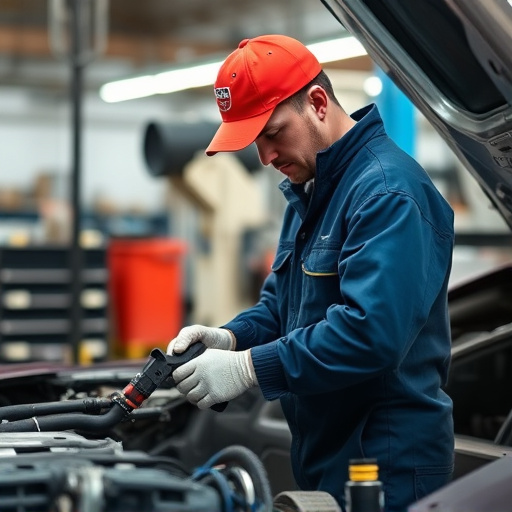EPA compliant body shops go beyond legal requirements by prioritizing environmental stewardship. They minimize pollution, use eco-friendly materials, and efficient waste management to preserve air and water quality. These practices not only cater to customer needs but also contribute to global efforts in resource conservation and ecosystem preservation, marking a significant step towards a greener future for automotive care.
An EPA compliant body shop isn’t just a business choice; it’s a commitment to environmental stewardship. This article explores the profound ecological advantages of adhering to Environmental Protection Agency (EPA) standards. We’ll delve into three key areas: how these regulations reduce pollution, conserve vital resources, and safeguard delicate ecosystems. By adopting sustainable practices, body shops can contribute to a greener future while ensuring they operate responsibly and ethically.
- Reducing Pollution: EPA Standards in Action
- Conserving Resources: Sustainable Practices Unveiled
- Protecting Ecosystems: A Safer Approach Ensured
Reducing Pollution: EPA Standards in Action

An EPA compliant body shop isn’t just about adhering to regulations; it’s a commitment to environmental stewardship. These standards significantly reduce pollution by controlling the release of harmful substances during vehicle collision repair and frame straightening processes. In the case of luxury vehicle repair, where precision and meticulous work are paramount, EPA compliance ensures that these high standards don’t come at the cost of ecological balance.
By implementing stringent protocols for waste management, emissions control, and the use of eco-friendly materials, an EPA compliant body shop plays a vital role in minimizing environmental impact. This not only contributes to cleaner air and water but also fosters a healthier ecosystem, reflecting a responsible approach that caters to both customer needs and the well-being of our planet.
Conserving Resources: Sustainable Practices Unveiled

An EPA compliant body shop isn’t just about adhering to regulations; it’s a commitment to conserving resources and minimizing environmental impact. These shops employ sustainable practices that extend far beyond mere compliance, such as using eco-friendly materials and water conservation techniques in car body restoration processes. By adopting advanced methods for car dent removal and car paint repair, they reduce the need for harsh chemicals and energy-intensive procedures.
This shift towards sustainability involves recycling materials where possible, utilizing non-toxic alternatives, and implementing efficient waste management systems. These practices not only benefit the local ecosystem but also contribute to a global effort to preserve natural resources. In essence, choosing an EPA compliant body shop means supporting a greener future for both automotive care and our planet.
Protecting Ecosystems: A Safer Approach Ensured

When an auto body shop adopts EPA compliance standards, it’s a step towards preserving our delicate ecosystems. These regulations ensure that hazardous substances used in collision repair and auto maintenance are handled, disposed of, and managed responsibly. This safer approach minimizes the potential for toxic chemicals to contaminate local water sources and harm nearby wildlife habitats. By adhering to EPA guidelines, these body shops contribute to a cleaner, healthier environment, not just within their walls but also in their surrounding communities.
Moreover, an EPA-compliant operation reduces the risk of accidents and health issues associated with improper chemical disposal. This not only protects employees but also fosters a culture of environmental stewardship among collision repair centers. Such practices are integral to promoting sustainability, demonstrating that it’s possible to provide quality services while maintaining ecological balance in today’s world.
An EPA compliant body shop isn’t just a business choice; it’s a commitment to preserving our planet. By adhering to stringent environmental standards, these shops significantly reduce pollution, conserve vital resources, and protect delicate ecosystems. Through sustainable practices, they offer a greener alternative, ensuring a brighter future for both businesses and the environment they operate within.













